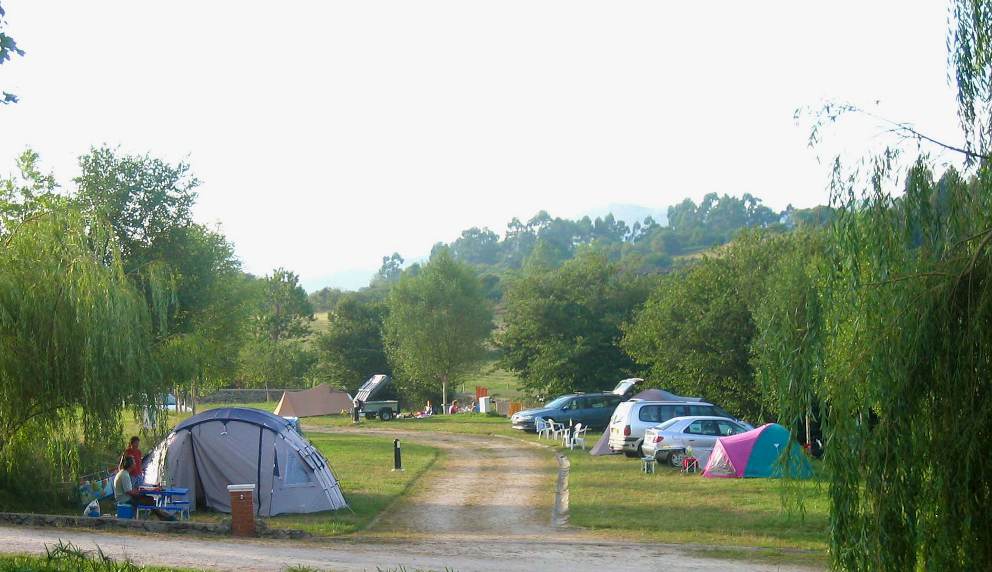
 Camping in rural Spain |
|
|
About-Spain.net
a visitor's guide to Spain |
|
| About-Spain.net | How to travel | What to see | Where to stay |
 About-Spain.net
on your mobile
About-Spain.net
on your mobile
Camping in Spain

About-Spain.net
- a travellers guide to Spain
| Page Index: | Camping
on the Spanish coast |
Camping
in inland Spain |
Is booking needed? | Classification of campsites in Spain |
The choice
Camping or glamping?
Glamping means (or should mean) luxury furnished camping accommodation in a good natural environment. Check out some glamping opportunities in Spain on our new partner Good-glamping.com - Spain
Whether it's tent camping, campervanning, or even for the hire of a
chalet or mobile home, Spain is a country with masses of opportunities
for campers; and they don't only come in the form of sprawling
high-density camping estates, crammed in between leisure parks and
high-rise hotels, along the worst parts of the Spanish costas.Glamping means (or should mean) luxury furnished camping accommodation in a good natural environment. Check out some glamping opportunities in Spain on our new partner Good-glamping.com - Spain
Camping on the Spanish coast

It would be self-defeating to provide here a list of small attractive and uncrowded campsites on the Spanish coast, as to do so could lead very rapidly to their becoming crowded with people looking for uncrowded campsites...... But to avoid the worst excesses, and if it's a campsite on the coast that you are definitely looking for, the first rule is to avoid the busiest tourist sectors of the Spanish Mediterranean coast, those sectors close to a motorway or within 40 minutes drive of Barcelona, Valencia, Alicante or Malaga. There are still some smaller reasonably attractive coastal campsites to be found on sections of the Spanish Mediterranean coast between these sometimes hyper-urbanized areas. The same is true along Spain's southern Atlantic coastline, to the west of Gibraltar.
There are, along Spain's Mediterranean coast, a number of Natural Parks (these are like national parks, only managed by the provinces); planning regulations here are strict - or meant to be - and exclude the development or vast campsites. Those that do exist are generally on a human scale, and blend into the landscape.
However, for the best selection of small coastal camping in Spain, the area to head to is northwest Spain; there are plenty of opportunities for camping on or near the coast in the provinces of Asturias and Galicia; and even to a lesser degree in the western part of Cantabria. Western Asturias and Galicia, in particular, remain to this day largely off the tourist trail - except for pilgrims heading to Santiago de Compostella - and there are not so many XXL campsites in these areas.
Nonetheless, even in these areas a word of warning is necessary. Not un-naturally, the Spanish themselves enjoy camping, and from April through to October, and more particularly in the summer months, many Spaniards take any opportunity they can to head out of the cities and enjoy a weekend in the country, or on the coast. Consequently, campsites that may be relatively deserted from Sunday night through to Thursday night, may suddenly become full-up on Friday night and Saturday night; so for tourists and other visitors with more time to spend, it is often best to avoid reaching a campsite late Friday or on Saturday, as there is a real risk of finding it full - or, which is not much better, largely full, so that the only spaces left are the least attractive ones, those next to the restaurant or a shower block, or the dustbins.
The full at weekends pheonomenon can include campsites anywhere on the coast, except in the most remote locations..... and there are not many of these in Spain.
Note, finally, that camping on the beach is generally illegal in Spain. Additionally, in the summer months, overnight parking of campervans is also frequently illegal, outside regulated areas or campsites; though during the rest of the year, when the tourist season is over, few places will complain about couple of campervans holed up on an otherwise-deserted seaside carpark. On the contrary, a few off-season campervans can bring in just a little business to local shops, bars and restaurants, even if they are parked for free.
Camping in inland Spain
What is true for coastal campsites in Spain is also true, to a lesser degree, for campsites in inland Spain. For instance Madrilenos, inhabitants of Madrid, are as likely to enjoy a weekend's camping as are people from Barcelona or Santander or Seville; and while some may take any opportunity they can to head for the coast, the coast is a long way from Madrid, so Madrilenos are more likely to head out in to the Spanish countryside for their weekends.Particularly popular with Madrilenos are campsites in the mountains around Madrid, the Sistema central to the north and west of Madrid, and the Sistema Ibérico to the northeast and east. These attractive mountain areas are largely unknown to visitors from outside Spain, so campsites in these areas, which lie in the provinces of Extremadura, Castilla y Leon and Castilla la Mancha, tend to be very busy at weekends and reasonably quiet from Monday through to Thursday nights, except in the school holiday periods.
There are campsites thoughout inland Spain, and often they are quite small. Except along the Mediterranean coast, most rural campsites in Spain will close during the winter months. It should not be forgotten that much of central Spain is a high plateau, parts of it over 1000 metres in altitude, and it is an area that can get cold in winter, very cold. Not really camping country, except for the hardiest of campers; and certainly not an area where there can be any economic justification for keeping a campsite open yearlong.
In addition to regular campsites, there are also free camping areas in many Spanish national parks or natural parks; but these may not have any facilities other than, maybe, a public toilet and a water tap (not necessarily drinking water). For campervanners, there are plenty of places for overnight stopping.
There is a fairly extensive map of Spanish campsites here ; the site is in Spanish, and for most of the small campsites indicated, there are no details, and no contact information. But it gives an idea of where there are campsites in Spain ..... which is pretty well everywhere.
Do I need to reserve?
The short answer is no, except at peak periods. Even in July and August, except for busy coastal campsites, it is normally possible to turn up and sign in.Classification of campsites in Spain
Like hotels, campsites can be classified, but there is no national scale. Classification of campsites is down to the autonomous regions of Spain. That being said, there are some commonly used scales; there is a traditional classification by category, with four main categories; "Lujo" (luxury), 1st category, 2nd category or 3rd category; and there is a more recent classification by stars, from five-star to one-star. The star system is essentially based on the French campsite star system.Some
useful sources of accommodation information:
- Small hotels with character : Independent hotels in Spain.
- Gitelink Spain : Rural holiday cottages in Spain
- Alojamentos y casas rurales - if you speak Spanish
| ►► Spain - a thematic guide: |
| Spain -
the country Essential information about Spain.
|
| Travelling
in Spain Getting round in Spain - by car, by
coach by train, or on foot
► Driving in Spain ► Spanish motorway map |
| Tourism in Spain
Where to go and what to see
► Undiscovered Spain ► Andalucia ► Valencia region ► Map of the regions of Spain |
| Accommodation
in Spain
Where to
stay, and the different options
available
|
| The
Spanish
way of life
Spain is different; all you need to know
about Spanish habits, including:
► Spanish food and eating |
| Too
cold for camping? Independent hotels in Spain Places to stay with character |
| 1a. iHi Spain - main index |
| 1b. Hotels in northern Spain |
| 2. Attractive small hotels in the south of Spain |
Find
hotels
in Spain
Barcelona
Andalucia
Valencia area
Madrid area
Castile
Aragon
Other areas of Spain
Click
for best
online rates for hotels in the following areas :
Costa
Brava Barcelona
Andalucia
Valencia area
Madrid area
Castile
Aragon
Other areas of Spain
About-Spain.net is
partnered with Europe's leading hotel booking portal, Booking.com, to
bring you the best online prices
Text and all photos on this page copyright © About-Spain.net 2022,
Accommodation
in rural Spain: check out the Gitelink
directory
of holiday
cottages gites
and B&Bs
many with English-speaking owners
many with English-speaking owners
>